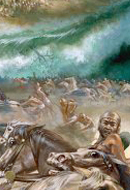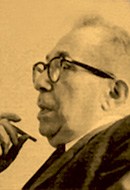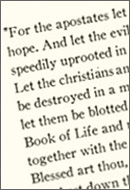Rabbinic Literature
 Rejoice When Your Enemy Falters?
Rejoice When Your Enemy Falters?Friday, March 22, 2013 by Shlomo M. Brody | Jewish Ideas Daily » Daily Features
Proverbs says, "When your enemy falters do not rejoice and when he stumbles do not feel glee." Does that apply even if your enemy is really, really evil?
 Whose Akedah Was It, Anyhow?
Whose Akedah Was It, Anyhow?Friday, October 26, 2012 by Moshe Sokolow | Jewish Ideas Daily » Daily Features
Today, October 26, 2012, the world’s Muslims will celebrate `Id al-Adha, commemorating Abraham’s willingness to demonstrate his love of God by sacrificing his son. While most Muslims assume that the son Abraham intended to sacrifice was Ishmael, this was not the unanimous opinion of early Muslims and Qur’anic scholars.
 Teshuvah: Progress or Return?
Teshuvah: Progress or Return?Monday, September 24, 2012 by Jonathan Ziring | Jewish Ideas Daily » Daily Features
While in theory the blowing of the High Holiday shofar should be enough to “awaken us from our slumber” and move us to repentance, in practice most people need to look to other sources to enable them to rethink the way they live or their understanding of repentance itself.
 “I, and Not an Angel”
“I, and Not an Angel”Thursday, September 20, 2012 by Shlomo M. Brody | Jewish Ideas Daily » Daily Features
"Warning: The Following Prayer May Be Dangerous to Your Spiritual Health. Recite with Caution." When was the last time you saw this kind of warning in a prayer book? Yet in most Ashkenazic S’lihot prayer books, that is the message that actually accompanies one of the hymns.
 Do Jews Curse Christians?
Do Jews Curse Christians?Tuesday, July 17, 2012 by Allan Nadler | Jewish Ideas Daily » Daily Features
The patristic authority Jerome complained bitterly about the Jews’ condemnation of notsrim (believers in Jesus, “the Nazarite”), in the benediction of the daily Amidah known as Birkat ha-Minim: "three times a day in all their synagogues they anathemize the Christian name."
Wednesday, June 27, 2012 by Shlomo Zuckier | Jewish Ideas Daily » Weekly Portions
The red heifer, which we read about in this week’s portion, serves to purify those rendered impure by contact with a dead body. This process is traditionally known as the hok par excellence, the archetype of an inexplicable statute in the Torah.
 The Chained Wife
The Chained WifeThursday, June 14, 2012 by Micah Stein | Jewish Ideas Daily » Daily Features
Yafa Friedman lives in a modest, two-story townhouse in Brooklyn. This past Sunday, the shades were drawn as a group of 30 protestors marched outside the house chanting, "Yafa Friedman—stop the abuse!"
 Sleepless on Shavuot
Sleepless on ShavuotThursday, May 24, 2012 by Moshe Sokolow | Jewish Ideas Daily » Daily Features
Two practices long associated with Shavuot, the "time of the revelation of the Law" (z'man matan Torateinu), are the enrolling of children in religious school and the marathon all-night study vigil (tikkun leyl Shavuot).
 Back From Heaven
Back From HeavenWednesday, April 25, 2012 by Micah Stein | Jewish Ideas Daily » Daily Features
In May 2011, Gallup conducted its annual "Values and Beliefs" poll, seeking to quantify religious demographics and beliefs in America. One question struck a national nerve, eliciting a consensus that defied religious or cultural distinctions. The question: Do you believe in heaven? The answer: Yes, overwhelmingly.
 The Stuttering Servant
The Stuttering ServantThursday, April 12, 2012 by Samuel Davidkin | Jewish Ideas Daily » Daily Features
Stuttering, the curious speech impediment that causes a few percent of the mostly male population to succumb unpredictably and unwillingly to occasional muteness, most recently received attention with the Oscar-winning film The King's Speech, the story of Britain's wartime King George VI.
Editors' Picks
Rashi the Preacher Martin Lockshin, H-Net. The medieval rabbi Rashi has traditionally been viewed as an analyst of biblical text. But a new book argues that some of Rashi’s commentary was less exegesis than pedagogy.
Why Is This Year's Passover Different from . . . ? Dovid Heber, Yeshiva World News. Passover, which begins on March 25 this year, has not fallen so early in the Gregorian calendar since 1899, and will not again until 2089. Why?
Rav Ovadia’s Revolution , Menachem Mendel. “Like Coca-Cola, l’havdil”: A video documentary on the idiosyncratic, infuriating genius of the Baghdadi gaon and the transformation of Sephardic Jewry in Israel.
Talmudic Stories, with Ruth Calderon Steve Paulson, To the Best of Our Knowledge. Woven into the Talmud’s legal arguments are “miniature stories,” written by Babylonian rabbis, that leaven the debate with human texture.
May Gentiles Learn Torah? Shlomo Brody, Jerusalem Post. An age-old question assumes new guises in our era, such as the case of non-halakhically Jewish children enrolled in Jewish schools.
Halakhic Jews and Modern Time Barry Kornblau, Torah Musings. You might not have noticed it, but an unusual event happened at about 7:00 p.m. in New York this past Shabbat, June 30, 2012: we experienced a leap second.
Scholarship at the Fault Line Monica Osborne, New Republic. English departments and literary studies curricula have yet to acknowledge the significance of Jewish and midrashic thought to their disciplines.
Hanging in the Balance Philologos, Forward. The Ethics of the Fathers teach that the evidence on each side of a case be weighed fairly; but what do we do when it is too close to call?
The Idealist and the Pragmatist Daniel Bouskila, Institute for Jewish Ideas. Two of Israel's Sephardic chief rabbis, Benzion Meir Hai Uziel and Ovadia Yosef, had strikingly different views about how Sephardic traditions were to meet Ashkenazic ones in Israel.
Between Tradition and Modernity Ari L. Goldman, Jewish Week. The same week in which the Conservative movement issued guidelines for performing same-sex marriages, it ruled against the use of computers, cell phones, and e-readers on Shabbat.

